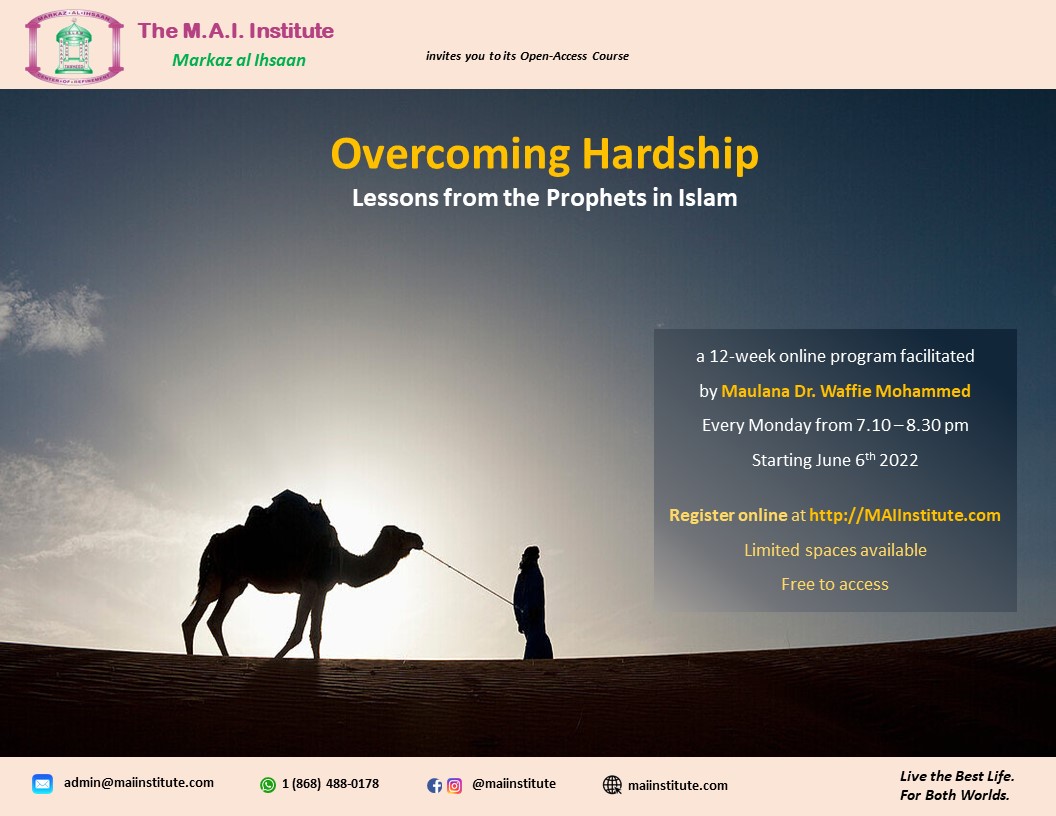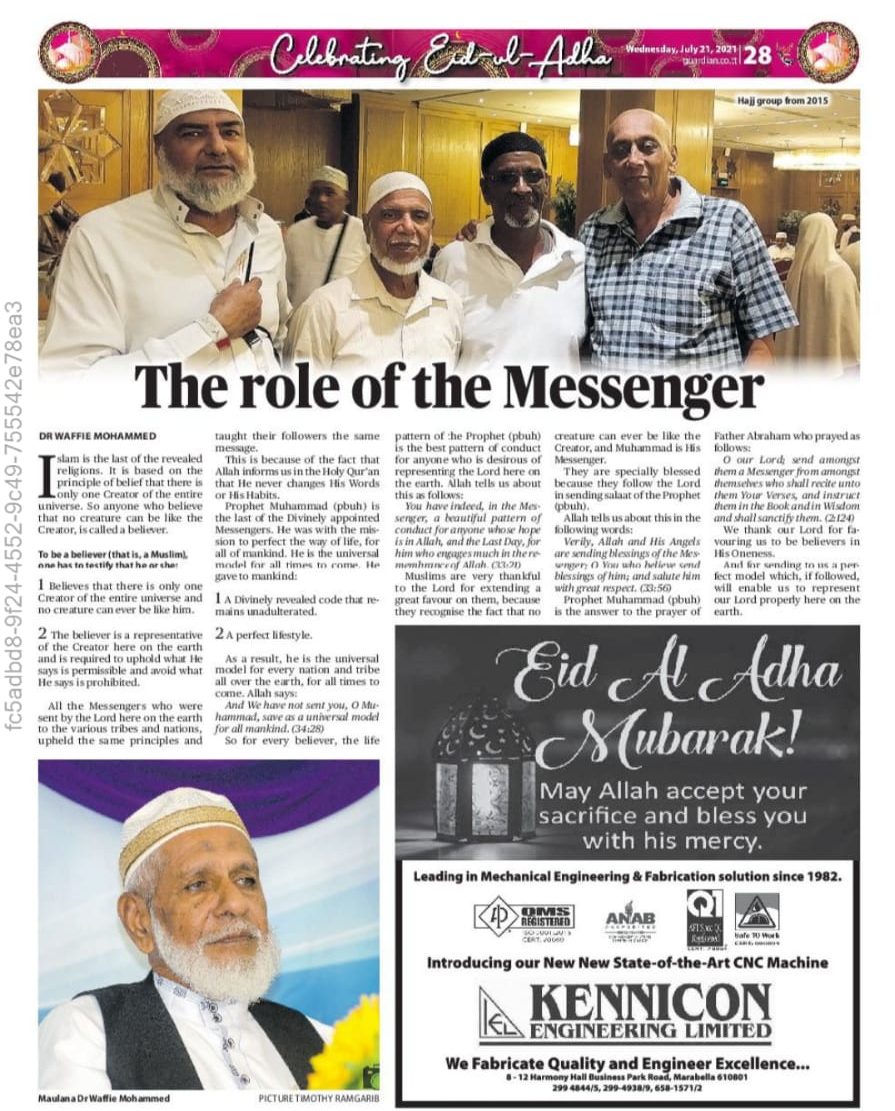The Holy Prophet
Category Archives:The Holy Prophet
Muhammad (pboh): A Model of Personal Development
On the occasion of Milad un Nabi we take the opportunity to learn more about our Holy Prophet Muhammad peace be on him.
In the Quran Allah tells us in chapter 3.31

Say, O Prophet, if you sincerely love Allah then follow me, Allah will love you and forgive your sins. For Allah is All-Forgiving, Most Merciful.
One of the examples the Prophet peace be on him left for us to follow is to method of personal development – how to become better versions of ourselves, and live a life to earn the best of this world and the next.
He gave us the formula to make that happen. In fact, he lived it. He strived consistently and selflessly for 23 years to establish Islam. For the first 10 years he was vilified and subject to ridicule and abuse by others, including his own family. This was in addition to dealing with the personal loss of his son, his wife and his guardian uncle. But he never gave up. He kept striving. Even after he migrated to Madina, he faced 3 wars in addition to burying 4 of his children, while in his 50’s, before he conquered Makkah. He was alive only 2-3 years after that, and buried 2 more children, before he himself passed away.
Today, he is recognized for his achievements – uniting the tribes, changing social behaviors and values, shifting the focus away from material wealth and fame to knowledge and conduct. He is acknowledged by Muslims and non-Muslims alike as one of if not the greatest leader who ever lived, based on achievement.
The principles he established have led to the formation or formalization of bodies of knowledge – developments in optics, astronomy, navigation, formalization of subjects like chemistry, biology, pharmacology, healthcare; in social sciences establishing the foundation for such disciplines as pedagogy, history, anthropology, sociology, economics; algorithms and algebra; and furthermore consolidation of world knowledge at the time, from civilizations across Greece, India, China, and North Africa.
He left an example as a husband and father, as a neighbor and as a friend. As an orphan, an employee and a migrant. As a social advocate, a revolutionary, a teacher, an Imam, a spiritual guide, a negotiator, a judge, a mediator, a stateman and leader.
He came to show us strength – he had every reason to be depressed; and have anxiety attacks; to be bitter and seek revenge. He chose faith and trust in Allah, and he chose forgiveness. He chose kindness, gentleness, caring and selflessness, even to those opposing him. He knew that everything happened for a reason – everything happened for the best – it was all part of Allah’s plan. In the meantime, he knew he had to do, what needed to be done, and he did it with patience. And endurance.
Today, we know that success in this world is the result of consistency, and success in the hereafter is the result of selflessness and total submission to Almighty Allah.
So how do we achieve these?
Consistency is achieved through discipline and perseverance or endurance.
Discipline we get from routine and habit. Doing something at fixed times every day, whether you want to or not. What helps you build routine? As Muslims we have salaat. Perform these actions within specific time periods during the day, every day. The thing about discipline is once you master it, adding to it becomes easy. You know when you have money you begin to see opportunities to make more money? It is the same with discipline. When you can achieve it, you see opportunities to add more effort, and maintain it easily. So we have a means to build discipline.
The next aspect of consistency is perseverance and endurance. These are achieved through sacrifice – sacrificing preference for patience. Now for later. Sacrifice builds drive and motivation to stay the course even when you are discouraged. Even when you are not seeing results. What helps you build endurance? As Muslims, we have fasting. Voluntarily give up very natural things – eating and drinking – for the duration of the daylight. When you want to control yourself, one of the best things you can do is fast. When you want to tame a wild animal, starve him first and then feed him. It is the same with our nafs. Starve it, then feed it, and you gain control over it. Then you can persevere in other efforts more easily – even when things get difficult you will be more able to see it through to the end.
So we have the means to build our capacity for consistency through discipline (salaat) and perseverance (fasting).
What of selflessness? We get to this point when we can we suspend our ego and care for others as much as we care for ourselves. Even more. In Islam, we are told to love for our brothers what we love for ourselves. How do we achieve selflessness? One way to do this is to give charity. Give charity, even if it is a little bit, often. You give of what you have and remind yourself that you are a custodian of all that you have – you don’t really own it, and the value is what it can do to change lives, not earn bragging rights. It makes no sense amassing it to stand above others, when you can help them instead.
You can also achieve selflessness through Hajj – making the pilgrimage, retracing the steps Bibi Hajar made to save her son, and in doing so becoming lost in the crowd with each person focused on only Allah. No importance is given to you beyond basic safety. It’s a humbling experience and tends to erode one’s ego.
So we know the formula. Consistency and selflessness. We have the tools – salaat, fasting, zakat and Hajj – that’s 4 of the 5 pillars of Islam. All are geared to help you build yourself and live your best life.
In the Quran 12:108 Allah tells prophet Muhammad peace be on him

Say, “This is my way; I invite to Allāh with insight, I and those who follow me.
On the occasion of Milad un Nabi, may we follow the example that we were given. May we achieve consistency and selflessness in all that we do, so that we earn the best for this life, and the next.

Overcoming Hardship: Lessons from the Prophets of Islam
The world has undergone a period of struggle with Covid restrictions. Emotional difficulties, physical health concerns and loss of loved ones, economic hardship and relationship challenges have all featured, and everyone has been affected in some way or the other. Some more than others, and some in multiple ways.
We are taught in Islam that the Prophets of Allah faced the most difficulties that persons would face, followed by others in different grades. Sa’d ibn Abi Waqqas reported: I said, “O Messenger of Allah, which people are tested most severely?” The Messenger of Allah, peace and blessings be upon him, said, “They are the prophets, then the next best, then the next best. A man is put to trial according to his religion. If he is firm in his religion, his trials will be more severe. If he is weak in his religion, he is put to trial according to his strength in religion. The servant will continue to be put to trial until he is left walking upon the earth without any sin.” [al-Tirmidhī 2398]
From this, we recognize there is much that can be learned about facing and overcoming hardships by examining the lives of the Prophets of Islam. To this end, MAI Institute is pleased to invite persons to access its free course – Overcoming Hardships – Lessons from the Prophets of Islam.
This 12-week online course is scheduled to commence on Monday June 6th, from 7.10 pm – 8.30 pm, and will be done via Zoom.
MAI Students can simply notify Admin to get registered. Any others wishing to register can do so via the following link: https://maiinstitute.com/register-here/ (Note – classes have limited spaces so please register early).
Learn of the various challenges of key different Prophets in Islam, and how that can help you today and in the future.
We hope to see you there.

The Role of the Messenger
Maulana Dr. Waffie Mohammed
Islam is the last of the Revealed Religions. It us based on the principle of belief that there is only one Creator of the entire universe. So anyone who believe that No creature can be like the Creator is called a believer.
To be a believer (i.e. a Muslim) one has to testify that he or she:
- Believe that there is only One Creator of the entire universe and no creature can ever be like him.
- The believer is a representative of the Creator here on the earth and is require to uphold what He says is permissible and avoid what He says is prohibited.
All the Messengers who were sent by the Lord here on the earth to the various tribes and nations upheld the same principles and taught their followers the same message. This is because of the fact that Allah informs us in the Holy Qur’an that He never changes His Words or His Habits.
Prophet Muhammad (pboh) is the last of the Divinely appointed Messengers. He was with the Mission to perfect the way of life for all of mankind. He is the universal model for all times to come. He gave to mankind:
- A Divinely revealed code that remains unadulterated.
- A perfect life style.
As a result, he is the Universal Model for every nation and tribe all over the earth for all times to come. Allah says:
And We have not sent you, O Muhammad, save as a universal model for all mankind. (34L28)
So for every believer, the life pattern of the Prophet (pboh) is the best pattern of conduct for anyone who is desirous of representing the Lord here on the earth. Allah tells us about this as follows:
You have indeed, in the Messenger, a beautiful pattern of conduct for any one whose hope is in Allah, and the Last Day, for him who engages much in the remembrance of Allah. (33:21)
Muslims are very thankful to the Lord for extending a great favor on them, because they recognize the fact that No creature can ever be like the Creator, and Muhammad is His Messenger.
They are specially blessed because they follow the Lord in sending salaat of the Prophet (pboh).
Allah tells us about this in the following words:
Verily, Allah and His Angels are sending blessings of the Messenger; O You who believe send blessings of him; and salute him with great respect. (33:56)
Prophet Muhammad (pboh) is the answer to the prayer of Father Abraham who prayed as follows:
O our Lord; send amongst them a Messenger from amongst themselves who shall recite unto them Your Verses, and instruct them in the Book and in Wisdom and shall sanctify them. (2:124)
We thank our Lord for favoring us to be believers in His Oneness. And for sending to us a perfect model which if followed, will enable us to represent our Lord properly here on the earth.